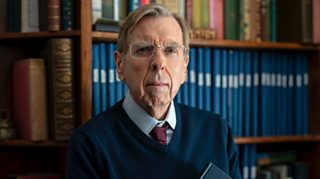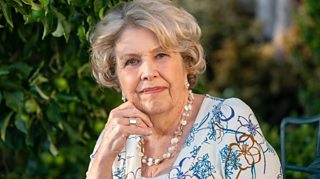The meeting between an inspirational teacher, Peter Farquhar, and a young student, Ben Field, sets the stage for one of the most complex criminal cases in recent memory. Writer, Sarah Phelps introduces the brand new four-part true crime ±«Óãtv One drama.
Watch the trailer for The Sixth Commandment
How did you get involved with The Sixth Commandment?
I was contacted by the ±«Óãtv who said they had been brought a really interesting story they would like to talk to me about. So I met with Executive Producers Derek Wax and Brian Woods and they then sent me a huge stack of material - I'm not kidding, it reached from the floor to my ribcage - which were the court transcripts, Peter’s diaries, the Thames Valley police investigation... They also sent me the documentary Catching a Killer: A Diary from the Grave which Brian executive produced. I remembered following the case as it was happening and I could feel it coming to life in my head as a story before I even started going through the research material.

Peter Farquhar (TIMOTHY SPALL) Photo Credit: ±«Óãtv/Wild Mercury/Amanda Searle
What was it about this case that you found so interesting?
There were so many elements to it. I started out thinking that this was a really twisted, sad story which had a fairy tale quality to it. It’s about an English village into which walks somebody who is entirely predatory but who quickly becomes absorbed into the life of the village - the university, the church, and he was so good at camouflage that nobody saw the wolf's clothing.
It felt like one of those Hans Christian Andersen or The Brothers Grimm fairy tales which everybody thinks are really cute but they're not - they're terrifying. I felt that there was something quintessentially English in this dark, dark fairytale in the sense that you could live in this ordinary place, where everybody knows you, you’re surrounded by good neighbours, and yet you could slowly die in front of them and nobody would know what was happening or say anything. That seemed to me to be the story, that tension between public respectability and private yearning, a sexual desire that you can't speak about that’s at war with your religious beliefs. All those elements drew me to the project.

(L-R);Peter Farquhar (TIMOTHY SPALL);Ben Field (ÉANNA HARDWICKE) Photo Credit: ±«Óãtv/Wild Mercury
So it is as much about the victims as it is about the crimes?
It is - I’ve spent a lot of my career writing about murder, and I think the victim is always the most important element. One thing I didn't want to do was to glamorise the killer. A lot of TV programmes give you the sense that you're falling under the spell of the killer, who’s incredibly intelligent, with some grand plan, but I wanted to understand and honour the victims, to give them life and dignity. They were more than just Ben Field’s victims. That backstory was really important for me. Peter and Ann led full, vibrant, intelligent, educated, lives full of curiosity with families, friends, social lives, their love of poetry and theatre and their devout faiths.
Tell us about Peter’s journals and what they revealed?
It was Peter’s diaries that helped the police to crack the case and to identify Field as a killer. He wrote assiduously every day, right down to the smallest, seemingly ridiculous, most tiny detail. When he began to write about falling ill, he didn't know of course that he was writing about his own murder. This man spent so much of his time writing about how kind Ben was being to him, bringing him cups of tea - and how four hours later he fell down the stairs.
What about Ann’s private life?
Ann had also led an extraordinary life. She'd been a model, a teacher and a headmistress. It was vital to me to go beyond seeing a photo of somebody in the paper which is how you then remember them. But there's all the life they’d led before they died, filled with their kindness, their curiosity, their generosity, their open heartedness, their faith, all of which made them a target in this case. It was really important to convey all of that spirit, rather than let Field have the final word, if that makes sense.

Ann Moore Martin (ANNE REID) Credit: ±«Óãtv/Wild Mercury/Amanda Searle
There must be a fine line between writing an entertaining script whilst remaining respectful?
Really good TV does something other than entertain, inform and educate, all of which sounds rather dry. I think it draws you into a really deep, dark story which doesn’t just tell you what happened but also how it happened which is just as important. It's about drawing people in, making them really invest in the story. Of course, there’s a fine line to walk but you can't be sententious - you want to tell a love story, because that's what those people believed they were living. You have to understand them and how they might have fallen prey to this man's lies, you've got to make them come to life so that what happens is really shocking. You need to get right under these people’s skins, think about who they are, who they love and what their life means to them; Peter as he writes his diaries or Ann as she walks her dog and looks forward to her family visiting. It was a new experience for me. I didn't want to be prurient but wanted to imagine the richness of their long lives and what they hoped for next. That felt really important to me as a way of driving the story forward, because they were never going to get there now. We also worked closely with the victims’ families, and they had to trust that I was going to do right by their loved ones.

Ann Moore Martin (ANNE REID);Anne-Marie Blake (ANNABEL SCHOLEY) Photo Credit: ±«Óãtv/Wild Mercury/Amanda Searle
What is it about the story that will appeal to audiences?
I think the appeal is that ultimately justice was done. The trial took place in 2019 so it's very recent. We peel back the layers of that case, which very quickly became about how this young man tricked and inveigled his way into the spotlight. It's about understanding the human cost of this story, not just for Peter and Ann, but also for their families. It’s also about watching exemplary people doing their detective work and finally tracking down somebody who had done terrible things.
How would you sum up The Sixth Commandment?
It's a very emotional and frightening story in a kind of ordinary way. It makes you think about how we live in our own little worlds and what we value in life. We need to look more closely at the people we think we know and realise so many are vulnerable and full of hope. And we need to be more vigilant about the people who come into our lives.
